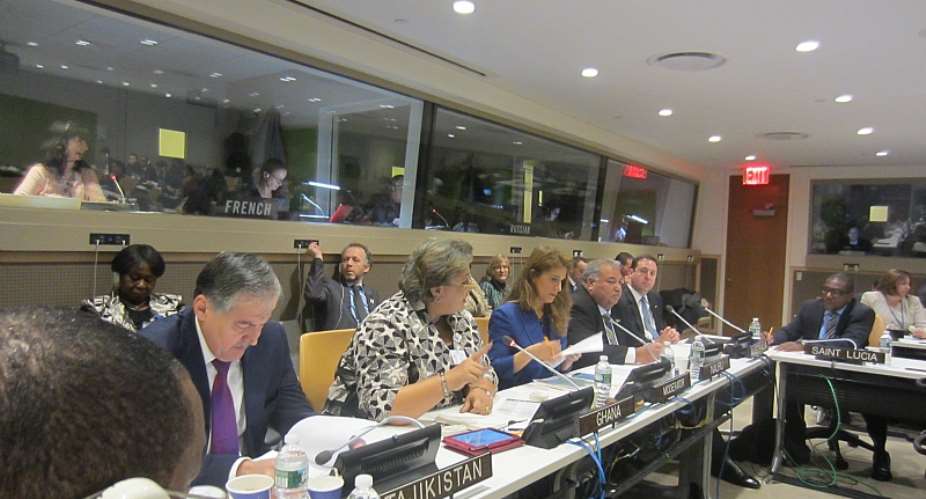High-level government representatives at a United Nations Development Programme (UNDP) 50th anniversary discussion on “Managing Risk and Building Resilience” have concluded that financing is a key lever for tackling disasters and challenges like climate change that have caused an estimated $1.4trillion damages worldwide.
At a ministerial meeting held on Wednesday ( February 24, 2016) at the United Nations headquarters in New York representatives from Ghana, Naura, Tajiskistan, Austria, Sudan, St. Lucia, Romania, Cuba, Maldova and the
European Union looked at challenges, opportunities and how to practically deliver risk-informed development in the context of the 2013 Agenda.
It formed part of the anniversary activities consisting of plenary and thematic breakout sessions aside videos.
Ghana’s Foreign Affairs and Regional Integration Minister, Ms. Hanna Serwa Tetteh, was among 80 Ministers selected from around the world to consider how to translate global development commitments contained in the Sustainable Development Goals and to help answer whether the current divide between humanitarian, peace, and security and development is conducive to finding durable solutions to current challenges.
Presenting the outcome of the session on ‘Managing Risk and Building Resilience”, which she chaired, Ms. Tetteh, said it is essential to develop effective institutional mechanisms to address the multiple challenges arising from climate change and disaster risks and adopt an integrated approach.
The Minister pointed out that “how we will pay for preparing, responding and recovering from disasters can save lives and preserve valuable regional, national and sub-regional assets. All funding decisions must ensure that development and risk are taken into account and leveraged to attract further public and private finance.
“While international assistance is a valuable part of the equation, national sources and the private sector must also play a role”, she stated.
To this end, Ms Tetteh maintained that a whole-of-society approach, involving civil society, private sector, communities and other stakeholders was imperative to facilitate risk-informed development.
Governance aspects , the Foreign Minister noted were also considered as key to managing risks and building resilience, such as the necessity to sustain a long term commitment through political transitions and an integrated approach across all socio-economic development sectors.
She therefore argued strongly that the potential for regional coordination and South-South cooperation needed to be better harnessed in order to complement international support. In this vein, she said the "universal and cross-boundary nature of challenges faced by countries and communities called for developing a shared regional and sub-regional strategy".
“Regional collaboration will help enhance the impact of national efforts and help countries to achieve the much-desired multiplier effect from their interventions, make change happen and enable societies to get over these challenges’, the Minister said, adding that “international organizations like the UNDP can help consolidate efforts and connect the risk management agenda more intimately with developmental efforts”.
Participants discussed a range of risks recognizing that geography and economy affect the magnitude of the impact of a disaster. Storms, seismic activity, droughts and floods can devastate vital infrastructure, food systems, water security and livelihoods. Indeed from 2005 to 2014, disasters have killed 700,000 people, displacing more than 250 million and affecting a further 1.7billion. This can have ripple effects on migration, conflict and security and vulnerable populations such as women and youth.
 Foreign Affairs and Regional Integration Minister, Ms. Hanna Serwa Tetteh interacting with some of the participants after one of the sessions
Foreign Affairs and Regional Integration Minister, Ms. Hanna Serwa Tetteh interacting with some of the participants after one of the sessions





 Saglemi Housing Project will not be left to rot – Kojo Oppong Nkrumah
Saglemi Housing Project will not be left to rot – Kojo Oppong Nkrumah
 Transport fares hike: GPRTU issue two-day ultimatum
Transport fares hike: GPRTU issue two-day ultimatum
 ARC endorses Alan as presidential candidate – Buaben Asamoa
ARC endorses Alan as presidential candidate – Buaben Asamoa
 Akufo-Addo appoints Kwasi Agyei as new Controller and Accountant-General
Akufo-Addo appoints Kwasi Agyei as new Controller and Accountant-General
 PNC dismiss reports of mass resignations
PNC dismiss reports of mass resignations
 PAC advocates for revenue collectors to be engaged on commission basis, not full...
PAC advocates for revenue collectors to be engaged on commission basis, not full...
 Genser Energy commissions 110km of natural gas pipeline at Anwomaso
Genser Energy commissions 110km of natural gas pipeline at Anwomaso
 Naa Torshie calls for tolerance, peace ahead of 2024 election
Naa Torshie calls for tolerance, peace ahead of 2024 election
 Asantehene commends Matthew Opoku Prempeh for conceiving GENSER Kumasi Pipeline ...
Asantehene commends Matthew Opoku Prempeh for conceiving GENSER Kumasi Pipeline ...
 Let’s do away with ‘slash and burn politics’ in Ghana — Dr Adutwum
Let’s do away with ‘slash and burn politics’ in Ghana — Dr Adutwum
